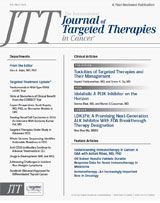Expert Perspectives: Scott Kopetz, MD, PhD, on Biomarker Models in CRC
The development of predictive biomarkers is widely accepted as an important milestone in the move toward personalized, or precision, medicine and the ability to identify the right drug for the right patient. JTT interviewed Kopetz about biomarker models.
Scott Kopetz, MD, PhD
The development of predictive biomarkers is widely accepted as an important milestone in the move toward personalized, or precision, medicine and the ability to identify the right drug for the right patient. In colon cancer, studies conducted over the past five years have not provided much insight for new drug development. None of the recent positive phase III studies involving newer agentsbevacizumab, ziv-aflibercept, and regorafenib—selected patients or evaluated them on the basis of molecular or pathologic particulars of individual tumors. And no new biomarkers have been identified during that time.
In an educational presentation at the 2013 American Society of Clinical Oncology (ASCO) Annual Meeting, Scott Kopetz, MD, PhD, associate professor in the Department of Gastrointestinal Medical Oncology, The University of Texas MD Anderson Cancer Center, Houston, outlined a new, and potentially more productive, way forward in biomarker development for a challenging form of cancer that is characterized by low-frequency biomarkers, considerable tumor heterogeneity, and acquired resistance.
Kopetz spoke about a taxonomy-based biomarker model that, in contrast with a “target-based” biomarker model that prevails today, classifies colorectal tumors based on their intrinsic biology, integrating multiple characteristics of tumors, including gene mutations, amplifications, methylation, RNA, and protein expression.
JTTinterviewed Kopetz about biomarker models.
You describe the current model for biomarker development as “target-based.” Could you briefly describe this model and provide an example?
Dr. Kopetz:We use the termtarget-basedto describe how we define a clinically unique population for whom we have different treatments. Target-based biomarker design aims to identify individual biomarkers that are closely linked to the activity of an available or experimental treatment.
The target-based approach can be useful in limited settings. In breast cancer, because we know that there are large numbers of estrogen-expressing tumors, this is a useful classification to define tumor types that we can treat. Similarly, HER2 overexpression in gastric cancer may provide opportunities to treat with an anti-HER2 monoclonal antibody.
The difficulty is that we are defining our classifications based on the drugs that we have and the targets that we have. If we have an ALK inhibitor, we are looking for anALKfusion oncogene. In colorectal cancer,KRAS-mutated patients are treated along one pathway, andKRASwild-type patients are candidates for EGFR therapy.
The argument that we are trying to make is that this “target-based” biomarker development is not fully capturing the essential biology and commonalities of colorectal tumors, and is limiting opportunities for development of novel therapies.
Proposed Paradigm for Pursuit of Biomarkers
Top: With a target-based (conventional) biomarker strategy, biomarkers are defined based on a drug target. Bottom: A taxonomy-based biomarker strategy starts with examining tumor biology using genomic profiling, then classifies tumors into homogeneous molecular subsets.
Colorectal cancer is more complex than a single biomarker can capture. There is a large spectrum of heterogeneity in colon cancer genomic amplifications, protein loss, epigenetic components. If we are granular enough, we recognize that every patient is unique and there are probably no identical tumors. But we also recognize that, at some level, we have to lump tumor biology together in order to move the field forward. This is the foundation of our emphasis on taxonomy-based biomarkers.
You mention that tumor heterogeneity is another shortcoming to a target-based model for grouping tumors.
Indeed. Some biomarkers are not uniform throughout a tumor. Some parts of the tumor may be expressing it and some may not. Some part of the tumor may have mutations and some won’t. This can provide difficulties in appropriately stratifying patients in a “target-based” model.
Also, there is temporal heterogeneitychanges over time that occur under the selective pressure of treatment. Chemotherapy may be driving certain biomarkers into extinction and causing other new ones to appear and grow.
It is a weakness if your sole method of classification is disappearing or reappearing or present in different parts of the tumor. This does not represent a robust classification model.
Can you describe the structurethe paradigm—that will pertain with this taxonomy-based biomarker model in colorectal cancer?
The proposed paradigm begins with defining tumor biology, initially by using genomic profiling, and classifying tumors into homogeneous subsets. This is a substantial undertaking that is being addressed in many labs and through large collaborations. However, these complex signatures will have to be condensed into clinical biomarkers that can distinguish these subsets. Ultimately, we would use these biomarkers for trial enrichment and stratification.
These large complex gene signatures are then condensed into appropriate clinical biomarkers that can distinguish these subsets, and are then used for trial enrichment and stratification.
For a taxonomy-based biomarker model, integration of multiple characteristics of the tumor is required. What is the challenge here?
The idea here is that we are trying to understand what the critical nodes arewhat critical pathways are activated [in a colorectal cancer], recognizing that there can be multiple ways that the cancer cell can activate that pathway.

Survivorship Care Promotes Evidence-Based Approaches for Quality of Life and Beyond
March 21st 2025Frank J. Penedo, PhD, explains the challenges of survivorship care for patients with cancer and how he implements programs to support patients’ emotional, physical, and practical needs.
Read More